#Medea too since she married Theseus’s dad
Note
Theseus ruins the entire timeline of Greek mythology
He really does like don’t even get me started.
#Medea too since she married Theseus’s dad#greek mythology#ancient greek mythology#greek pantheon#theseus greek mythology#theseus#Athens
10 notes
·
View notes
Text
Villain Moms!
Destroying Children’s Happiness Since Ancient Greece
NOTE: None of the illustrations or gifs belong to me.
Let's take two fairy tales, shall we? Seems innocent enough. We'll do Little Red Riding Hood and Hansel and Gretel. Both about kids in the woods who meet strangers who intend on eating them. Great fare for kids, right? Bruno Bettleheim did this in his book The Uses of Enchantment, but I'm going to make his point shorter—what is the best part of Little Red Riding Hood?
“When she gets in there and confuses her granny with a wolf in drag.”
Crude, but correct. Everyone LOVES the “what big teeth you have” reveal. There is an element of fun to the Wolf. He's enjoyable...as he's preying on a small child. Kids lean forward and start smiling when Red enters the house and isn't quite sure of what she's seeing. It's naughty fun that ultimately gets punished anyway, so why not indulge a little?
Now, what is the best part of Hansel and Gretel?
“........when Gretel shoves the Witch into the oven?”
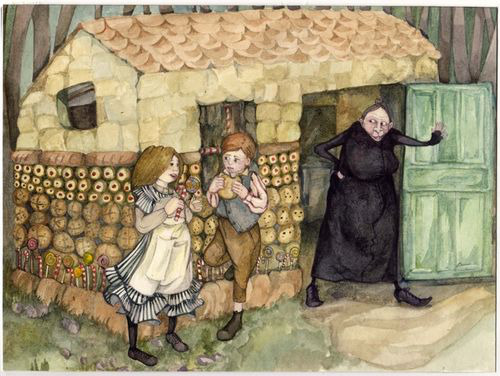
“Of all the days I lent my gun to the witch two forests over.”
Yeah, kids cheer when the Witch meets her demise. Meeting her is not fun; it's scary. The kids realizing the stranger with candy is luring them into a trap isn't fun; Hansel's shoved in a cage to be fattened up while Gretel is freakin' enslaved! Look at the painting, for goodness sake! The candy exterior looks more and more like human heads as you get closer to the Witch! Human heads!
“What's your point? You've told us over and over again fairy tales are darker than people think.”
Yes, but what's the real difference between the villains here? The Wolf uses trickery and seduction (of a kind) to get what he wants, but we find him charming and fun to the point that a small part of us wants him to win. The Witch uses trickery and seduction (of a gluttonous kind) to get what she wants and we are relieved when the old lady is burned alive in her own oven. I submit to you my thesis—women are scarier than men, and therefore, the scariest woman of all is your mother.
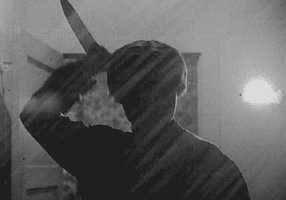
Fiction is full of horrible parents, fathers and mothers, but there is something about the latter that truly makes us afraid rather than thrilled. Why?
DISCLAIMER: There will be spoilers.
Pioneers of Evil
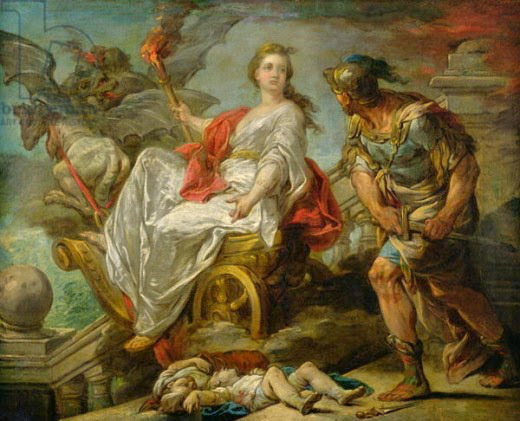
Medea: I’ve been working on this one-liner all day! (clears throat) Now YOU clean up that mess!
In the Greek play Medea, the eponymous character is a witch from a far-off land who helped Jason and the Argonauts obtain the Golden Fleece. It was a Happily Ever After moment when she left her crazy family and went off with a hero right up there with Theseus and Perseus. The playwright Euripides, though, decided there wasn't enough angst and fan-fictioned a sequel where Jason leaves Medea to marry a princess. Medea's idea of punishing Jason? Killing their two sons. Heinous, yes, but she's portrayed as a tragic figure, kind of like a female King Lear.
There is an assumption that parents are predisposed to love their children above all else, but sadly, this just isn't true. In 70% of cases where a child is killed by one of his/her parents, it's the mother. Neglect was the main type of abuse in 66% of cases involving a female caregiver vs. 36% of cases involving a male caregiver. However, it's important to note that women still spend way more time with kids than men do, and when a man is charged with violence against a child, it's very likely the woman in the household is charged, too, not to mention that in cases of murder/suicides in the same household, males are the perpetrators 90% of the time.
Depressing subject matter today.
So is there a precedent for bad moms getting more attention than bad dads? Well, in classic literature, right before the Trojan War started, the Greek king Agamemnon sacrificed his daughter to the gods in hopes they would give him fair winds on the way to Troy. His wife, Clytemnestra, was understandably outraged, and when her husband came home from war, she and her lover killed him. But Clytemnestra is remembered not for being an avenging mother, but for being a cheating wife and a scheming queen who is pursued by Orestes in another play to avenge his father's death. Ah, Greek mythology—the only soap opera people will think you're smart for following.
“Can't you talk about something a little lighter?”
Okay. Let's talk about Snow White.
“Shit.”
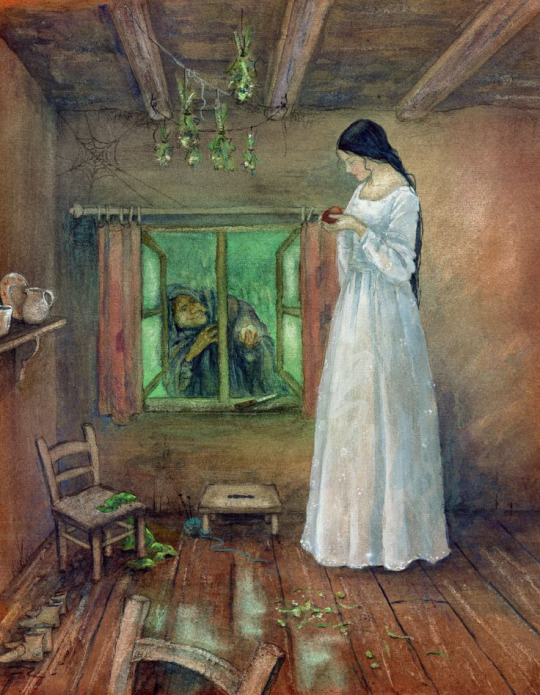
“I thought they kept you around to keep this place clean?”
In the first edition of the Brothers Grimm collection, the Evil Queen is Snow White's mother, not a stepmother. Jealous of her daughter's youth and beauty, she takes her out to pick flowers and abandons her there. From that point on, the tale is all about the Queen having the determination of the Terminator in that she tries to kill Snow with a really tightly laced corset, a poisoned comb, and then a poisoned apple. This queen also didn't have a magic mirror, but talks with the sun itself about who the fairest is, and suns don't lie. The Grimms censored the peasant stories they collected, though, and decided by the next edition that it would be “better” if this was a stepmother going after Snow White and she outsourced the first murder attempt to a Huntsman who would ultimately chicken out.
We'll get to stepmothers later, but isn't it telling that we remember the female fairy tale villains more than the male ones? The stories in the Grimms' Children's and Household Tales have more than their fair share of bad dads, ones who gamble with their daughters' lives (and sometimes their souls), ones who are so financially irresponsible their sons are left with no inheritance, ones who imprison their kids in towers, and even ones that want to bed their own daughter. But we remember the scary moms the most.
“Who's telling these stories???”
Well, moms. And grandmas. The Grimms didn't invent these stories; women did, peasant women who had a ton of work to do and had to 1.) make sure their kids didn't go into the woods, and 2.) make sure their kids appreciated them so they would do what they were told and, again, wouldn't go into the woods. In this time, mothers dying was common. Dads remarrying was common. These stories where a mother is absent sent a subtle message to the listeners that a woman's life was hard. Elderly women were valued even less because they were past childbearing years, so all those stories where a seemingly inconsequential old beggar woman turns out to be a powerful fairy or benevolent fairy godmother? Self-promotion. When kids are running for their lives in the woods and find a gingerbread house in the middle of nowhere, maybe the kid listening to the story starts to feel a little sorry for these kids, huh? These poor, abandoned little idiots who didn't have a mother to tell them this is definitely not a good idea, huh?
So we definitely pay more attention to the evil mothers because they terrify us and moms know and exploit this. Hmm.
When Stepmothers Ruin Lives
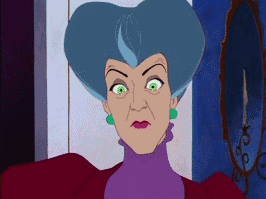
Eat your heart out, Maleficent.
Beetlejuice, Labyrinth, Enchanted, Sleepy Hollow, The Parent Trap, Double Indemnity, The Ramayana, and even The Tale of Genji, the world's oldest surviving book, all have evil stepmothers in them. The oldest ballads from England are crawling with them, and the Hansel and Gretel story actually has one, the woodcutter's wife (sometimes the biological mother) whose idea of saving money is to leave the kids to die in the woods.
By far, the most famous wicked stepmother would have to be Cinderella's, in every incarnation of the story. The Disney version makes it a point to tell us that the father has died, leaving a very young Cinderella in the care of a woman whose “true nature was revealed—cold, cruel, and bitterly jealous of Cinderella's charm and beauty.” But many versions don't tell us the father's fate; he's just that unimportant to this story about one woman oppressing another.
No matter what personality your main character has or what they go through, most protagonists have to strike out on their own and become independent, self-actualized people, and it's a lot easier to do that if there isn't much tying them to home and childhood. As fairy tales moved up the social ladder into the salons, so did the role of a stepmother. A peasant man might remarry for love, and a stepmother's role would be to continue having children and raise the ones that are already there. So whether they loved her or hated her, the stepmother was a big part of the kids' lives. An aristocratic stepmother, however, might spend more time as a wife and being the lady of the house than being a nurturer, so it would be easier for the kids to hate her and see her as something a little more demonic. In “The Juniper Tree,” the stepmother straight-up DECAPITATES her stepson and pins the blame on her own daughter. The Russian fairy tale “Vasilissa the Beautiful” has a girl in such dreadful Cinderella circumstances that she is sent by her stepmother to Baba Yaga, an old Russian bogeyman sort. The tale “Brother and Sister” has siblings fleeing their abusive witch of a stepmother who turns the boy into a deer and almost succeeds in killing the sister.
Do stepmothers have it out for their stepchildren? As of 2011, 4 out of 10 Americans have at least one step-relative. However, stepfathers are more likely to be violent toward the kids than stepmothers. Kids are more likely to be killed by non-family members than by their stepmothers. The most common “motives” for these adults killing their children are anger/revenge (40%) and substance abuse (36%), which seems to indicate that these are heat-of-the-moment crimes of passion rather than some calculating sociopath moving in and eliminating the kids so they can have Dad all to themselves or something like that. The supposed “Cinderella Effect,” which claimed that children with a step-relative were about 40 times more likely to be murdered, has a lot of attributing factors and there may have been some biases with the studies.
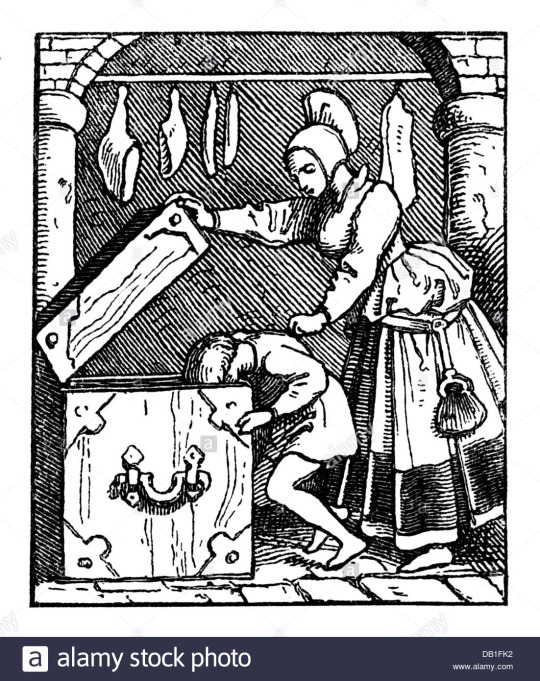
“Are the toys further down in the chest, Stepmother? To the side of this painted target?”
So it seems that a relatively non-violent member of a family is singled out, creating a disproportionate number of stories where the stepmother is almost always the bad guy, but the stepfather only sometimes is. Well, this does kind of make sense. The stories, while dark, were cautionary tales to be told to children, and children usually spend more time with their mothers/stepmothers/grandmothers than the male members of the family, so yeah, spending the day with the crazy woman trying to kill them would be scarier than spending an hour in the evening with the crazy guy who only might want to kill them.
When the Bad Moms Run Amok
Literature was racking up the evil mother/stepmother points, reveling in evil, scary women who were charged with looking after children. Jane Eyre starts the book out living with her aunt who verbally and physically abuses her, but spoils her two biological daughters. James of Giant Peach fame lives with two evil aunts. Harry Potter's mother figure is abusive and neglectful to him, as is Fanny Price's guardian, and even Shakespeare has gotten in on the act with Tamora in Titus Andronicus.
In most of these stories, we see the mother from the perspective of a child. Neil Gaiman's Coraline is one of the most blatant examples and one of the most realistic ones. In his story, neither Coraline nor her mother are perfect. Coraline has bratty tendencies, and her mother can be distant and overworked. Mrs. Jones in the film doesn't smile all that much, can be a bit snarky, and since she's in a neck brace after a car accident, she's not always in that great a mood.
She's a bit short with her daughter, but she is doing her best, and the movie (gentler with the characters than the book) implies that it isn't always this way, just when her parents are approaching deadlines. However, this deadline is right at the time they have moved, so Coraline feels especially uprooted. Without going into too many details, Coraline discovers a world parallel to hers where she has “Other Mother,” a mother who is consistently sweet, pleasant, cooks for her, plays games with her, and gives her whatever she wants.
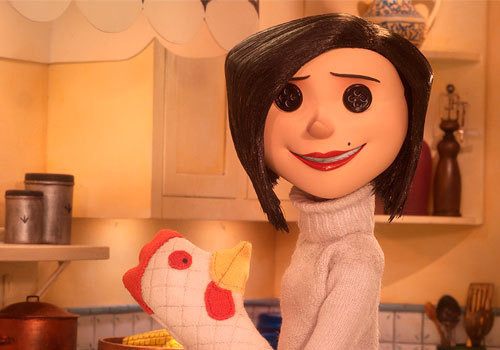
She has chickens for hands! Run for your lives!
Those of you who are genre-savvy may be able to see where this is going, but Coraline has a unique distinction of being a story that frightens adults more than kids. Adults often find its imagery and story details disturbing, but it strikes a nerve with younger readers/viewers and everyone gets creeped out. Win-win.
But Coraline also has issues with her father, who is also overworked. Charlie Jones may be a little friendlier than his wife, but Gaiman describes him as one of those dads who thinks by embarrassing their kids that he's being cool and the voice actor describes him as a guy who would swerve to avoid slipping on a banana peel only to fall into a manhole. A bit bumbling, doesn't cook all that well, and is apparently so busy he can't even shave. But Other Father, well.......without giving anything away, Other Mother is the one you need to watch out for.
Many mothers feel that they do less than their own mothers did, many stay-at-home mothers feeling pressure to be good mothers because they feel that's all they have to contribute, going so far as to feel guilty for asking their husbands for help with chores. Most men today, on the other hand, feel they do more than their fathers did, and don't have the same intensity of inadequacy feelings that mothers do. The amount of negative emotions women feel increases after they have children, especially in the years when the children are under 3. It's all very selective, too. When you ask a mom if she likes spending time with her kids, she says yes, remembering fun activities like playing at a park with them or reading books to them. But when asked to recall their day, the moms remember all the time spent getting the kids to do this or that, breaking up the fights, yelling to get things done, and disciplining when the children disobey.
“All this sounds normal.”
It is. But we're conditioned to feel that it isn't.
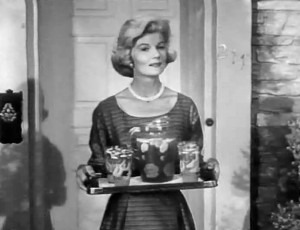
To be absolutely fair, Barbara Billingsley said she wore pearls to hide a shadow created by the hollow of her neck, and her high heels were to appear taller than the actors playing her sons as they grew older. And who WOULDN’T want what’s in this pitcher?
Leave it to Beaver's June Cleaver is usually held up as the ideal mother, up at the crack of dawn making a hot breakfast for her family every day, vacuuming and doing dishes in pearls, and having a house so spotless it looked like a prop man came in and cleaned between scenes. However, she was often snarky and witty, told her sexist boys that girls have just as much ambition as boys do, and was always wise to Eddie Haskell. Her relationship with Ward is also more nuanced than pop culture believes. The two of them traded good-natured barbs, discussed parenting like partners, and when she deferred to him for disciplinary actions, it was usually so she would look like the nicer parent.
But unfortunately, the show was about creating an image. What people took away was that this woman didn't have interesting story lines like her kids did, and she wasn't as prominent an authority figure in their lives as their father was. The house WAS spotless all the time, whether the prop man did it or not. She WAS up early doing chores in fancy dresses and made it look easy, and we're taught at a young age that these chores are supposed to be fun. I'm all for making work fun and kids learning young that work has to get done whether you like it or not, but you don't see toy washing machines marketed toward little boys all that much. We are bombarded with images of moms doing housework HAPPILY and all conflicts with kids being resolved QUICKLY and rather PAINLESSLY.
Today's mother get bombarded with images of super, idealistic parenting, too. The internet and social media have photos of DIY projects that create more storage in kids' rooms, art and cooking projects you can do with your kids for cheap-but-meaningful quality time. We are one click away from looking at summarized studies that tell you how much screen time your kids should have, how much time outdoors they should spend (but with sunscreen, anti-bacterial wipes, and bottled water handy at ALL times), what you should and shouldn't say when a pet or Grandma dies, etc. When in the past, moms had their moms and the occasional parenting book, we have advice EVERYWHERE, so the pressure to succeed is heightened, but the definition of success has expanded. What do you mean your kid isn't an athletic, musically inclined, chess expert who reads Proust and is in the above-average math class and spends Saturdays volunteering at a soup kitchen? Don't you want them to have high self-esteem?
Bad Moms Make Better Protagonists
We tend to forget Scarlett O’Hara is a mom.
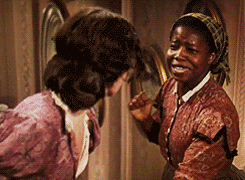
I know, right? How did we forget that?
We usually find stories where characters don't get along more interesting than ones where they do. In the book, Scarlett has three kids by three different fathers—Wade by Charles Hamilton, Ella by Frank Kennedy, and Bonnie by Rhett. And she's terrible to all of them. Not because she has postpartum depression or anything like that. She's just not interested in them. Wade is so neglected it's easy to forget he's in the book at all, and Ella may or may not be a victim of Fetal Alcohol Syndrome as all we're really told about her is that she's ugly. Bonnie's rather doted upon, but Rhett spoils her rotten, perhaps to compensate. Anyway, they suffer for their bad parenting when Bonnie dies and Scarlett is pretty distraught. Not anywhere near Rhett's suicidal level, but distraught. Like a grieving mother would be. The movie probably thought Scarlett would be more sympathetic if Bonnie was her only child, what with that Hays Code demanding bad behavior be punished, and bad mothering is bad behavior.
It's even easier to forget that Daisy Buchannon from The Great Gatsby and Emma Bovary from Madame Bovary are mothers because they're just so inattentive. Their kids just don't show up on their radar.
Alfred Hitchcock managed to create a protagonist/antagonist out of a mother that was already dead when he directed Psycho. No small feat. There are previous films where his characters had severe mother issues like Strangers on a Train, and even Cary Grant's mom in North by Northwest is kind of awful (and only like 6 years older than him), but Psycho brought mommy issues to the forefront in the form of Norman Bates, a mild-mannered, sweet guy who has the burden of caring for an invalid mother and a dying motel business all by himself.
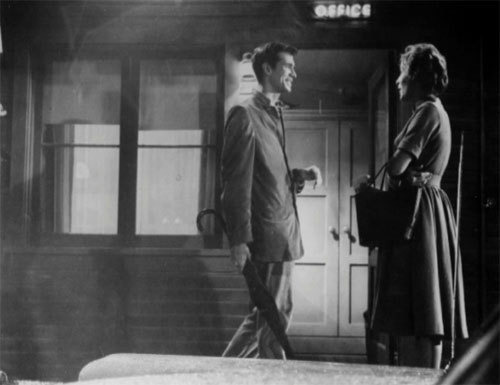
Norman: Ignore the eerie mist and creepy house on the hill. I ate the last guest, so I'm too full to eat you! Ha ha, this is a joke I have made. Welcome to the Bates Motel!
I may be the only critical movie watcher who likes the psychologist's summing up scene near the end of the movie. Most find it stops the movie dead and takes away from the atmosphere, but I don't think it's that bad. For one, it clarifies that the Mother personality Norman has is kind of his own problem. Yeah, it's hinted that Mother was pretty bad, but all we have to go on is Norman's perspective. The psychologist says that while Norman was jealous and clingy of his mother, he also believed she was jealous of him. That's why “she” kills women he takes sexual interest in. It shuts down the idea that Mother was a complete monster and Norman was a nice guy. That's only partly true. It also differentiates between one of Norman's personalities being female and your garden variety transvestite, making it a point to say that Norman is not getting any sexual kicks out of wearing his mother's clothes, and that the men who do aren't typically violent or dangerous in any way. The real Mother may have been abusive and a master manipulator (“I'm not even going to swat that fly”), but Norman's perception of her that hasn't changed since he was a child makes her larger than life, an almost supernatural villain whose sole purpose is to make life difficult for her son.
Never mind the fact that Norman himself killed her because she had a boyfriend.
The bad mother isn't usually just a part of back story. She is usually an active player in the present-time plot of a story. Margaret White in Carrie, for example, is sort of responsible for the entire plot as it's implied that Carrie wouldn't have developed her powers if she hadn't suffered her mother's abuse.
https://www.youtube.com/watch?v=12wHDwNXBL0 --Behold, the day Carrie got her first period.
Religious maniacs as villains weren't anything new when Stephen King wrote the story, and I'll be very quick to point out that King doesn't seem to put that much thought into his characters (an alcoholic from Maine who has problems! Genius!), but Margaret is one of his better crafted ones, and director Brian DePalma knew exactly how to make the most of the late Piper Laurie's acting abilities. We meet her as a reasonably pretty, pleasant woman except that it's the 70s and she's wearing something that looks more like a witch's cape. She has scenes where she does neutral-to-positive things with Carrie like share a piece of cake with her, and she seems protective of her in not wanting her to go to the prom....only shouting that everyone will laugh at her and calling her breasts “dirty pillows” may not be the best way to go about things. I'm not going to lie: her very vivid and explicit death at the end is very satisfying.
It's the blatant disregard for their children's mental health as well as physical that makes for some top-notch villains, like Eleanor Iselin from The Manchurian Candidate who is totally okay with her son being a brainwashed assassin and seems to harbor incestuous feelings for him.
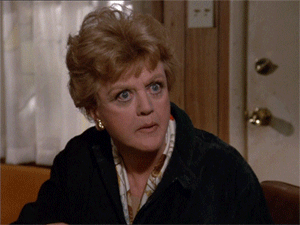
“Tell me more about my randy younger days!”
Even sitcoms cash in on this frequently, softening the bad mother only to the point where she is slightly smothering. The overbearing mother can be both a villainous and sympathetic role to play, which is probably very rewarding for a talented actress. Take Doris Roberts' portrayal of Marie on Everybody Loves Raymond, a woman who has an obvious favorite child, has no sense of boundaries with either of her kids, constantly fights with her husband, and belittles her daughter-in-law whenever she gets the chance. But she can be surprisingly sympathetic, as the show explores when she has to deal with one son having a dangerous job, a history of an insensitive husband, and just the overall sorrows motherhood brings.
The Ultimate Scare Factor
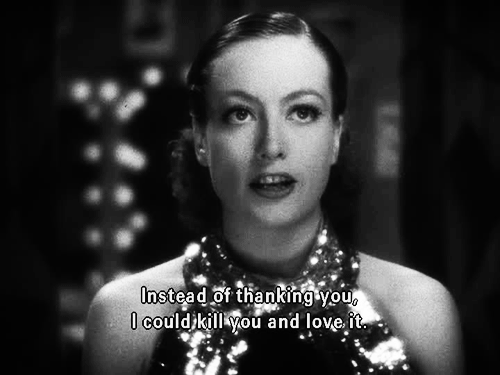
Poor Joan just couldn’t NOT be insane ever.
In 1978, Christina Crawford wrote a tell-all about her adoptive mother, famed actress Joan Crawford...and almost single-handedly destroyed her reputation. Some found it to be revenge since Christina Crawford was cut out of her mother's will, whereas others believe every word of it. Bob Hope, Cesar Romero, Barbara Stanwyck, and even Crawford's first husband say they never saw anything that would lead them to believe the events in the tell-all were true, but Helen Hayes, June Allyson, Betty Hutton, and Christina's brother Christopher all have said they'd witnessed abusive behaviors. The movie based on the book, Mommy Dearest, is now seen as an unintentional comedy due to Faye Dunaway's performance, but Joan Crawford (and Faye Dunaway) were never looked at the same way again.
It may seem obvious now that a celebrity in the 50s wouldn't be all that he/she seemed, but this was the first expose of this kind, and it was considered pretty shocking. Here it is half a century later and the likes of Andrea Yates and Casey Anthony are household names. It still shocks us when a mother is bad to the point of murder. And it should.
That's why mothers as villains are more terrifying than fathers as villains—it's more shocking.
Motherhood is still romanticized and yet heavily scrutinized, which means moms have to walk a very thin line. A 2014 study looked at 125 articles by mental health professionals in scholarly journals and found that mothers were blamed for 72 different kinds of problems in their children, everything from bed-wetting to schizophrenia. People point out that women are still more likely to take kids to doctors and therapists more than men, so it's easier to blame the mother when something is wrong. You have a face. Most parenting books recommend mothers limit their time with their children to avoid smothering them and/or forgetting about their individual needs, but dads are encouraged to spend as much time as possible with their kids.
The result of this is that stressed mothers tend to withdraw even more from their children. We don't want to be the crazy murderous moms in fiction, so we avoid that. But let's learn from these bad moms. Were there common factors?
“Mental illness = Villainy.”
Well......yes. Film especially sees mental illness as its own villain cornucopia. But another one may be lack of a support system. Carrie's mother is all alone and seems to have a bad history with Carrie's father. Scarlett has a lot of people in her social circle, but she ends up being stuck taking care of most of them, and even the person at Tara she was closest to, Melanie, has a skewed idea of motherhood, believing every woman wants a baby and that babies make things better. On that note, a lot of men complain about the lack of paternity leave they receive when their children are born. I've talked about the difficulties women have, but that doesn't mean men have none. They are pressured to be breadwinners and spend more and more time with this new kid so they will be a better dad than their dad was.
Hell, even Mother Bates had no resources, the psychologist telling us that for years she and Norman lived like there was no one else in the world but the two of them. Maybe moms who are overprotective to the point of smothering have abandonment issues. Maybe moms who engage more in substance abuse than Dr. Seuss (I was wondering if I could fit that in somehow) are intensely overwhelmed. Maybe stressed-out moms who yell all the time don't have other adults to talk to and only have Pinterest to compare themselves to.
The good news is that a strong support system and a clear idea of what is normal can help. In virtually every article I looked up for this thing, the professionals made it clear that they've never met a perfect parent, mother or father. And it's pretty futile to try to be one even though you want to be.
Fiction is also finally looking at mothers as interesting characters in their own right, not automatically assigning them roles as either cipher or villain. All three of Once Upon a Time's female leads are mothers, Sarah Connor of Terminator fame has both positive and negative traits, and Modern Family's Claire and Gloria get to be as much a part of the comedy as the rest of their family. Anne Shirley in Anne of Green Gables finds a stern but devoted adoptive mother in Marilla Cuthbert. All these women have something going on other than just being a mom, whether they stay home or work or whether they are of our time or part of another world.
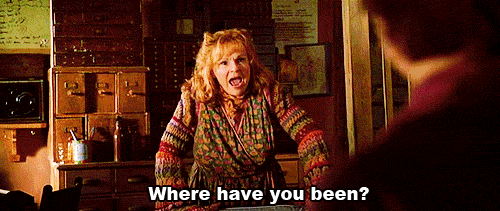
Harry Potter does find a mother figure in Molly Weasley, a witch with seven kids and a husband who apparently gets paid to figure out what a rubber duckie is when he could just go find some Muggles and talk to them like they're people. Anyway, she was just kind of that background snuggly character you knew your protagonist could cry to when things got tough, but when she took out Bellatrix Lestrange, there was some controversy. “How can a housewife beat a Deatheater?” The stereotype that mothers are meek, passive, soft, uninteresting women living vicariously through their children was prevalent. But Molly kicked Voldemort's Number 2's ass just the same, and we all owe her a parade for that. The way she holds the chaotic Weasley brood together is commendable enough, but when she told Sirius Black that Harry was like a son to her, all our hearts melted.
0 notes